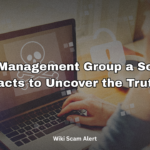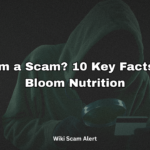Have you received a letter warning you about your property’s deed and urging you to pay a fee? If so, you may be the target of the recorded deed notice scam. This fraudulent scheme tricks homeowners into paying for unnecessary or fake services, often using official-looking documents to appear legitimate. Many victims panic and send money without realizing that these records are available for a small fee—or even free—through their local county offices. In this guide, we’ll break down how this scam works, who is being targeted, warning signs to look out for, and how to protect yourself from becoming a victim.
Recorded Deed Notice Scam Overview
The recorded deed notice scam is a deceptive scheme that targets homeowners, tricking them into paying for unnecessary or fraudulent services related to their property deeds. Scammers send official-looking letters, emails, or even make phone calls claiming that the homeowner must urgently obtain a copy of their deed to avoid penalties or legal consequences. These notices often mimic government documents, complete with official seals, letterheads, and urgent-sounding language.
In reality, property deeds are public records and can be obtained from county offices for a small fee or even for free online. Unfortunately, many victims panic when they receive these fraudulent notices and end up paying the scammers, believing that they are fulfilling a legal requirement. This scam has been reported across the United States, with thousands of homeowners falling victim to these deceptive tactics.
How the Recorded Deed Notice Scam Works
This scam operates through a series of calculated steps designed to mislead and pressure homeowners into making unnecessary payments. Here’s a closer look at how it typically unfolds:
- Sending Fake Notices – Homeowners receive a letter in the mail, email, or text message that looks like an official government document. It warns them that they need to obtain an official copy of their property deed immediately.
- Creating a Sense of Urgency – The notice often claims that failure to comply will result in penalties, legal trouble, or complications with property ownership.
- Requesting Payment – The scam letter demands a fee, typically between $80 and $150, for a copy of the property deed. It may direct homeowners to mail a check, call a phone number, or visit a fraudulent website to make a payment.
- Disguising the Scam as a Legitimate Service – Some scammers operate under business names that sound official, such as “National Deed Service” or “Property Record Services,” making their scheme appear legitimate.
- Disappearing After Receiving Payment – Once the victim sends payment, they either receive nothing in return or a simple copy of their deed that they could have obtained from their county recorder’s office for a much lower fee.
This scam relies on a lack of awareness among homeowners about how property deeds work. Many assume that these notices are real, especially if they are first-time property owners.
Common Tactics Used in the Recorded Deed Notice Scam
Scammers use a variety of deceptive tactics to manipulate homeowners. Some of the most common tactics include:
- Impersonation of Government Agencies – Fraudsters use names that closely resemble official government offices, such as “County Deed Processing Center” or “State Property Records Bureau.” They also use letterheads and seals that look official.
- Fake Deadlines and Legal Threats – The letters often claim that action must be taken immediately to avoid late fees, penalties, or even legal action. This urgency prevents homeowners from thinking critically or verifying the information.
- Inflated Fees for Publicly Available Documents – The amount requested is significantly higher than what county offices charge for deed copies, making the scam highly profitable.
- Use of Official-Looking Language – The notices may include legal jargon such as “Final Notice,” “Property Transfer Verification,” or “Failure to respond may result in action against your property.”
- Targeting Vulnerable Homeowners – First-time buyers, senior citizens, and those unfamiliar with real estate transactions are prime targets for this scam.
- Phony Websites and Call Centers – Some scammers set up websites that mimic government portals where homeowners can enter their payment details, putting them at risk for identity theft.
Understanding these tactics can help homeowners identify fraudulent notices before they fall victim to the scam.
Warning Signs of a Recorded Deed Notice Scam
Recognizing the red flags of a recorded deed notice scam can save you from financial loss. Here are the most common warning signs to watch for:
- Unsolicited Notices Requesting Payment for Deed Copies – If you receive an unexpected letter asking for money to obtain your property deed, be cautious.
- High Fees for a Public Document – Deed copies typically cost between $2 and $15 at your local county recorder’s office, not the excessive amounts scammers demand.
- Urgent or Final Notice Language – Scammers create a false sense of urgency to pressure victims into acting quickly without verifying the legitimacy of the request.
- Fake Government Seals and Letterheads – While some scammers make their documents look official, close inspection often reveals inconsistencies such as incorrect government logos or misspellings.
- Requests for Personal or Financial Information – Scammers may ask for Social Security numbers, credit card details, or other sensitive data, which a legitimate government office would never require via mail or phone.
- No Official Contact Information – Legitimate county recorder offices have phone numbers and physical addresses that you can verify. Scam letters often provide only a P.O. box or a vague email address.
- Scam Websites Mimicking Government Agencies – Always check the URL before entering personal information. Government websites typically end in .gov, while scam sites may use .com or .us domains.
By staying alert to these warning signs, homeowners can avoid being tricked into sending money to fraudsters.
Who Are the Targets of the Recorded Deed Notice Scam
Scammers target a wide range of homeowners, but certain groups are at higher risk due to their level of experience with property ownership and access to information.
- First-Time Homebuyers – Many new homeowners are unfamiliar with property deed procedures and may assume the notice is a required step in homeownership.
- Elderly Homeowners – Senior citizens are frequently targeted because they are less likely to verify online sources and may be more trusting of official-looking mail.
- Real Estate Investors – Those who own multiple properties may receive numerous fraudulent notices, increasing their likelihood of falling for the scam.
- Busy Professionals – Homeowners with demanding careers may not have time to investigate the legitimacy of a notice and may pay the fee out of convenience.
- Recent Property Buyers – Scammers often target individuals who have recently purchased a home, as their information is fresh in public records.
- Non-English Speaking Homeowners – Those who struggle with English may have difficulty verifying the notice and may be more likely to comply out of fear of legal repercussions.
- Homeowners in High-Value Property Areas – Scammers often target homeowners in affluent neighborhoods, assuming they can afford to pay the fraudulent fees.
If you fall into any of these categories, staying informed is crucial. Understanding how the recorded deed notice scam operates can help prevent financial loss and frustration.
Property Site Recorded Deed Notice Scam Variations
The property site recorded deed notice scam comes in different forms, with scammers continuously adapting their tactics to deceive homeowners. While the core scam remains the same—tricking individuals into paying for unnecessary or fraudulent deed services—there are several variations to be aware of:
1. Fake Online Property Record Services
Scammers create fraudulent property record websites that appear official. They may use names such as “National Property Records Bureau” or “Official Deed Processing Center” to seem legitimate. When homeowners search for property deed services, these websites appear in search results, directing them to pay a high fee for documents that they could obtain from the county recorder’s office at a much lower cost.
2. Targeting Homeowners via Real Estate Websites
Fraudsters use real estate listing platforms to identify recent homebuyers. They then send fake notices disguised as essential property documents, pressuring the new owners into making payments for unnecessary deed copies.
3. Impersonating Title Companies or Escrow Services
Some variations of the property site recorded deed notice scam involve fraudsters posing as title companies or escrow services. They send notices claiming that deed verification is a required step in the home closing process. This targets buyers who may not be familiar with real estate procedures.
4. Overcharging for Basic Property Information
Some fraudulent property record services charge fees as high as $150 to $200 for property reports that contain little to no additional information beyond what is already available for free from government offices.
How to Spot and Avoid These Scams:
- Always obtain your property deed from the county recorder’s office.
- Be cautious of websites that claim to provide “official” deed services but charge high fees.
- Verify any notice with your county office before making payments.
County Deed Records Final Notice Scam
The county deed records final notice scam is a specific variation of the recorded deed scam that preys on homeowners by using fear tactics. This scam typically involves letters that falsely claim a property owner must act immediately or face legal consequences.
How This Scam Works:
- Fake “Final Notice” Letter Sent to Homeowners – Scammers mail letters labeled as “FINAL NOTICE,” designed to appear urgent and time-sensitive.
- Threats of Legal Consequences – The notice may claim that failure to comply will result in penalties, title disputes, or foreclosure risks.
- Requests for Payment – The letter demands a payment (usually between $80 and $150) to provide a copy of the property deed.
- Use of Fake Government Logos – Fraudsters include seals and formatting that resemble official county documents.
- Redirecting Homeowners to a Fake Call Center or Website – The notice provides a phone number or website where victims can submit payments.
Signs of a County Deed Records Final Notice Scam:
- The notice appears urgent and pressures immediate action.
- The fee is much higher than the county recorder’s actual cost for obtaining a deed copy.
- The letter is sent from a third-party entity rather than your official county office.
- Contact information does not match the official county recorder’s office.
Fake Government Agencies and Impersonation Tactics
One of the most deceptive elements of the recorded deed notice scam is the impersonation of government agencies. Scammers deliberately design their communications to mimic official entities, creating confusion and a false sense of legitimacy.
Common Fake Agency Names Used by Scammers:
- “U.S. Property Deed Records Office”
- “National Deed Service Bureau”
- “Statewide Title Deed Processing”
- “County Property Transfer Agency”
- “Department of Property Records and Deeds”
How Scammers Impersonate Government Agencies:
- Use of Official-Sounding Names – Scammers choose names that sound like actual government agencies, even though no such organizations exist.
- Fake Government Seals and Letterheads – Many scam notices include unauthorized use of official-looking seals, stamps, and fonts.
- Urgent and Legal-Sounding Language – The scam letters often include phrases like “official document,” “required action,” or “final notice.”
- Requests for Sensitive Information – Some scammers ask for personal details such as Social Security numbers or bank information, putting victims at risk for identity theft.
- Setting Up Fake Websites – These fraudulent websites may look professional but often lack real contact details or verification methods.
How to Identify and Avoid Fake Government Agency Scams:
- Always verify official government notices by checking your county’s website.
- Remember that government agencies do not send unsolicited mail demanding payments.
- If unsure, call your county recorder’s office directly using the official number found on their government website.
Recorded Deed Notice Scam Letters and Notices
Scammers rely heavily on deceptive recorded deed notice scam letters to trick homeowners. These letters are designed to look official and create a sense of urgency.
Key Features of Scam Letters:
- “Final Notice” or “Urgent” Labels – Scammers use bold red text and capitalized words to create a sense of urgency.
- Fake Government-Like Formatting – The letter may include fake letterheads, seals, or watermarks.
- Misleading Fee Requirements – It falsely states that a high fee must be paid to obtain a deed copy.
- P.O. Box Return Address – Most scammers use non-traceable P.O. boxes instead of actual government office addresses.
- No Direct Contact Information – There is usually no phone number for verification with a government office.
What to Do If You Receive a Suspicious Notice:
- Compare the notice with official county recorder documents.
- Look up the county office website and call their direct phone number.
- Never send money or personal information without verifying authenticity.
- Report the scam to the Federal Trade Commission (FTC).
Recorded Deed Notice Scam Phone Calls and Emails
While mail notices are the most common approach, some scammers use phone calls and emails to carry out the recorded deed scam.
Recorded Deed Notice Scam Phone Calls:
Scammers may call homeowners, posing as county officials or property record agencies. They claim that:
- The homeowner must pay for a deed copy immediately to avoid penalties.
- There is an issue with the property’s legal documents that needs urgent resolution.
- The homeowner needs to verify personal information for “record updates.”
The caller may sound professional and may even spoof local government phone numbers to make the scam more convincing.
How to Handle Scam Phone Calls:
- Do not share personal or financial information.
- Hang up and call your county recorder’s office directly.
- Report scam calls to the FTC and your state’s consumer protection agency.
Recorded Deed Notice Scam Emails:
Some scammers send emails that mimic official government communications. These emails often:
- Contain urgent subject lines like “Immediate Action Required – Property Deed Notice”
- Include links to fake websites designed to collect payment information
- Request personal details for “verification purposes”
- Use fraudulent government logos and formatting
How to Identify Scam Emails:
- Check the sender’s email address – Official government emails end in .gov, not .com or .net.
- Hover over links – If the URL does not match a legitimate government website, it is likely a scam.
- Look for poor grammar and spelling mistakes – Many scam emails contain language errors.
What to Do If You Receive a Scam Email:
- Do not click on any links or download attachments.
- Mark the email as spam and delete it.
- Report it to the FTC and your county recorder’s office.
Legal Actions Against Recorded Deed Notice Scammers
Authorities across the U.S. are cracking down on the recorded deed notice scam, bringing legal action against fraudsters who exploit homeowners. These scams often violate federal and state consumer protection laws, leading to lawsuits, fines, and even criminal charges.
Recent Legal Cases and Crackdowns
Many states have taken steps to investigate and prosecute scammers running these fraudulent deed notice schemes. Here are some notable actions:
- State Attorney General Lawsuits – Several state attorneys general have sued companies sending misleading deed notice letters. In some cases, courts have ordered them to cease operations and pay restitution to victims.
- Federal Trade Commission (FTC) Actions – The FTC regularly investigates fraudulent businesses engaged in deceptive mail practices. Companies caught engaging in the recorded deed notice scam have faced hefty fines and shutdown orders.
- Consumer Protection Laws – Many states have laws against unfair and deceptive business practices. These laws have been used to take legal action against scammers who send fraudulent property deed notices.
- Class Action Lawsuits – Homeowners who were misled into paying fees for unnecessary or fraudulent deed services have filed class action lawsuits against deceptive businesses, seeking refunds and damages.
Potential Penalties for Scammers
Individuals and companies caught running the recorded deed notice scam can face severe consequences:
- Fines and Penalties – Regulatory agencies can impose heavy fines on scammers for deceptive business practices.
- Restitution Orders – Courts may require fraudsters to pay back victims.
- Criminal Charges – In cases of identity theft or mail fraud, scammers can face felony charges leading to jail time.
How Legal Action Helps Victims
If authorities take legal action against a scam operation, victims may be eligible for refunds. Checking with the FTC, state attorney general offices, or consumer protection agencies can help you find out if a case has been filed against a fraudulent company.
How to Protect Yourself from the Recorded Deed Notice Scam
The best defense against the recorded deed notice scam is awareness and vigilance. Here are key steps to protect yourself from becoming a victim:
1. Understand That You Don’t Need to Pay for a Copy of Your Deed
- Your county’s recorder’s office keeps official property deed records.
- You can request a copy directly from them, usually for a small fee (typically $5–$25, not $80–$150 like scammers charge).
2. Know the Signs of a Scam Notice
- Urgent, threatening language: “Final Notice! Immediate Action Required!”
- Excessive fees: Scammers overcharge for basic public records.
- Misleading company names: They use official-sounding names to appear legitimate.
- Fake government seals: Some scammers include unofficial seals or watermarks.
3. Verify Any Property-Related Notices
- Contact your county recorder’s office directly to confirm if the notice is legitimate.
- Check official websites before making payments.
4. Don’t Respond to Suspicious Phone Calls or Emails
- Government agencies do not demand payments over the phone or via email.
- If you receive a call claiming to be from your county office, hang up and call the official number yourself.
5. Report Suspicious Activity
- If you suspect a recorded deed notice scam, report it to the FTC, state attorney general, and consumer protection agencies.
By staying alert, verifying information, and reporting fraudulent activity, you can avoid falling for this scam and help others do the same.
What to Do If You Receive a Recorded Deed Notice Scam Letter
If you receive a suspicious recorded deed notice letter, follow these steps to protect yourself and take the appropriate action:
Step 1: Do Not Pay Anything
- The letter might claim you must pay for a copy of your deed, but this is false.
- Your official property deed is safely recorded with the county recorder’s office, and you can obtain a copy for a much lower cost.
Step 2: Verify with Your County Recorder’s Office
- Contact your county office directly (find their number on an official government website).
- Ask if they sent the notice—99% of the time, they didn’t.
Step 3: Check for Scam Red Flags
- Does the letter claim to be from a government agency but uses a non-government address?
- Does it demand immediate payment for a service that isn’t actually required?
- Is there no official county website or phone number listed for verification?
If any of these apply, it’s likely a scam.
Step 4: Report the Scam
- Federal Trade Commission (FTC) – Report online at reportfraud.ftc.gov
- State Attorney General – Most state AG offices handle consumer fraud complaints.
- Better Business Bureau (BBB) – File a complaint against the company.
Step 5: Warn Others
- Tell friends and family about the scam, especially elderly homeowners who may be targeted.
- Share alerts on local community websites or forums.

How to Verify Legitimate Deed Notices
Legitimate property deed notices are rarely sent unsolicited. If you receive one, you should verify it before taking any action.
Steps to Verify a Legitimate Deed Notice:
- Look for Official Government Contact Information
- A real notice will include a phone number and website from your county recorder’s office.
- Search for your county recorder’s website online and compare the contact details.
- Check for Overly High Fees
- A genuine deed copy costs between $5 and $25, depending on your location.
- If the letter demands $80, $100, or more, it’s likely a scam.
- Examine the Sender’s Address
- Government agencies use official office addresses, not P.O. boxes or untraceable mail drops.
- Call Your County Office Directly
- Use the official phone number listed on the government website, not the number in the notice.
- Ask if the letter is legitimate.
- Look for Scam Indicators
- Urgent wording like “Final Notice” or “Immediate Action Required”
- Requests for personal or financial information
- Fake government seals or letterheads
By carefully checking these details, you can determine whether a recorded deed notice is legitimate or a scam.
How to Report a Recorded Deed Notice Scam
Reporting a recorded deed notice scam is important to stop fraudsters and prevent others from being scammed. Here’s how to report it effectively:
1. Report to the Federal Trade Commission (FTC)
- The FTC investigates scams and deceptive business practices.
- File a complaint online at reportfraud.ftc.gov
- Provide details about the scam notice, including the sender’s name and any contact information.
2. Report to Your State Attorney General
- Most state attorney general offices handle fraud cases.
- Find your state’s AG office at www.naag.org
- Submit an online consumer fraud complaint.
3. Report to the Better Business Bureau (BBB)
- File a BBB complaint at www.bbb.org
- This helps warn others about scam businesses.
4. Report to Your County Recorder’s Office
- Alert your county office about the fraudulent notice.
- This can help them warn other residents about the scam.
5. Report to the U.S. Postal Inspection Service (USPIS)
- If the scam came by mail, report it to the Postal Inspection Service.
- Visit www.uspis.gov and file a report for mail fraud.
By reporting scams to the right agencies, you help protect others and increase the chances of legal action against fraudsters.
Financial Impact of the Recorded Deed Notice Scam on Homeowners
The recorded deed notice scam may seem like a small deception, but its financial effects can be significant. Homeowners who fall for this scam often pay excessive fees for unnecessary services, and in some cases, they become victims of identity theft or fraudulent property transfers.
1. Direct Financial Losses
Victims of the scam typically pay between $80 and $150 for a deed copy that they could have obtained from their county office for just $5 to $25. While this may seem like a minor amount, these scammers often operate at a massive scale, targeting thousands of homeowners.
2. Fraudulent Property-Related Charges
Some scammers use fake deed notices as a gateway to bigger frauds. Once they have a homeowner’s payment information, they may:
- Charge unauthorized fees for fake “property monitoring services.”
- Enroll victims in fraudulent legal assistance plans related to property protection.
- Sell personal information to third-party scammers who conduct real estate fraud.
3. Risk of Identity Theft
Some recorded deed notice scams request additional personal details, such as a Social Security number, property tax ID, or bank information. Scammers can use this information to:
- Commit mortgage fraud in the victim’s name.
- File fake property transfer documents to claim ownership of a home.
- Apply for credit or loans using stolen personal information.
4. Home Title Fraud & Property Theft
In extreme cases, scammers have used fake deed-related notices to deceive homeowners into signing fraudulent property transfer forms. Home title fraud is a serious crime where criminals steal property ownership and use it to take out loans or sell the property illegally.
By understanding these financial risks, homeowners can stay vigilant and avoid unnecessary losses caused by the recorded deed notice scam.
Case Studies of Recorded Deed Notice Scam Victims
The recorded deed notice scam has impacted thousands of homeowners across the U.S. Here are real-life cases that illustrate how deceptive and harmful these scams can be:
Case Study 1: Florida Senior Pays $95 for a Fake Deed Copy
Mary Thompson, a 72-year-old retired teacher in Florida, received an urgent letter stating that she needed to pay $95 to obtain her property deed. The letter looked official, using government-like seals and formal wording.
- She paid the fee, assuming it was necessary.
- Later, she found out she could have received the deed from her county office for just $10.
- Despite reporting the scam, the company had already disappeared.
Case Study 2: California Homeowner’s Identity Stolen After Responding to a Scam Notice
John Rivera, a homeowner in Los Angeles, received a letter from what appeared to be his county office. The letter requested a processing fee and additional personal information, including his Social Security number.
- After providing the details, John started receiving credit card bills for accounts he never opened.
- His identity was stolen, and someone attempted to take out a $30,000 home equity loan in his name.
- Fortunately, he caught the fraud early and worked with authorities to secure his accounts.
Case Study 3: Home Title Fraud in Texas
A couple in Texas, James and Linda Martinez, nearly lost ownership of their home after receiving a fraudulent “property verification form” from a scammer posing as a deed services company.
- The form contained fine print that authorized a transfer of ownership.
- They unknowingly signed and returned it, thinking it was part of a standard deed verification process.
- A scammer filed the forged documents with the county recorder’s office, making it appear as though their home had been sold.
- The couple had to take legal action to reclaim their rightful ownership.
These real-life stories highlight the dangers of the recorded deed notice scam and why homeowners must be cautious before responding to any unexpected property-related notices.
Recent News and Updates on the Recorded Deed Notice Scam
The recorded deed notice scam continues to make headlines as government agencies crack down on fraudulent companies and issue warnings to the public.
1. FBI & FTC Investigations on Property Deed Scams
The Federal Bureau of Investigation (FBI) and Federal Trade Commission (FTC) have recently launched investigations into companies accused of sending deceptive deed notice letters to homeowners.
- In February 2025, the FTC issued a nationwide warning about a surge in property deed fraud cases.
- The FBI reported that real estate scams increased by 35% in 2024, with fake deed notices being one of the most common tactics used.
2. State Attorneys General Take Legal Action
- In California, the state attorney general’s office sued a company that sent over 100,000 fraudulent deed notices. The company was ordered to pay $2 million in penalties.
- In Texas, a similar scam operation was shut down after officials discovered it had collected millions from unsuspecting homeowners.
3. USPS Warns of Fake Government Mailings
The U.S. Postal Inspection Service (USPIS) recently issued a fraud alert regarding mail scams that mimic official government documents.
- They advised homeowners to be cautious of unsolicited mail requesting payments for public records.
- The warning emphasized that official property documents can be obtained directly from local government offices for much lower fees.
Government Warnings and Consumer Alerts About the Recorded Deed Notice Scam
Government agencies at federal, state, and local levels have issued multiple warnings about the recorded deed notice scam.
1. Federal Trade Commission (FTC) Warning
- The FTC warns that deceptive mailings about property deeds are a common scam tactic.
- The agency urges consumers to report fraudulent notices and avoid sending payments to suspicious companies.
2. Better Business Bureau (BBB) Scam Alerts
- The BBB has received thousands of complaints from homeowners who received fake deed notices.
- They advise consumers to always verify information with their county recorder’s office before making any payments.
3. State Attorney General Warnings
- Multiple state attorneys general have issued consumer alerts urging homeowners to watch out for misleading letters requesting money for property documents.
- Some states have set up task forces to investigate real estate fraud and prosecute those responsible for scamming homeowners.
Raising Awareness and Preventing the Recorded Deed Notice Scam
Public awareness is one of the most effective ways to combat the recorded deed notice scam. Here’s how individuals, businesses, and communities can help:
1. Educate Homeowners
- Homeowners should be aware that deeds are public records and can be obtained from the county recorder’s office without the need for a third party.
- Community organizations should host informational sessions to educate people on property-related scams.
2. Warn Vulnerable Groups
- Seniors and first-time homebuyers are often prime targets for these scams.
- Family members should regularly check in with elderly relatives to ensure they don’t fall for fraudulent notices.
3. Share Scam Alerts on Social Media
- Posting scam alerts on Facebook, Nextdoor, and local community forums can help warn others.
- Encouraging people to report suspicious letters can help authorities shut down fraudulent operations faster.
4. Support Stronger Consumer Protection Laws
- Advocacy groups can push for stronger legislation to regulate companies that send misleading property-related mail.
- Increased penalties for deceptive practices can deter scammers from targeting homeowners.
Understanding the Recorded Deed Notice Scam
What Is the Recorded Deed Notice Scam?
The recorded deed notice scam is a deceptive scheme where fraudsters send official-looking letters to property owners, claiming they must pay a fee to obtain a copy of their property deed. These scammers often impersonate government agencies or title companies to make their notices seem legitimate.
How Scammers Exploit Property Owners
Scammers use fear and urgency to trick homeowners into paying unnecessary fees. They exploit a lack of knowledge about property records and use misleading language to pressure victims into sending payments.
Who Are the Targets of the Scam?
Homeowners and First-Time Buyers
New homeowners who are unfamiliar with property records are prime targets.
Senior Citizens and Retirees
Scammers often target older individuals who may not be tech-savvy and are more likely to trust official-looking mail.
Real Estate Investors and Landowners
People who own multiple properties may receive several fake notices, increasing the risk of falling for the scam.
Conclusion
The recorded deed notice scam is a common yet deceptive fraud that preys on homeowners’ lack of knowledge. By staying informed and verifying any suspicious notices with your county recorder’s office, you can avoid falling victim to these scams. If you receive a suspicious letter, report it immediately to the appropriate authorities to prevent others from being scammed.
FAQs
1. How can I tell if a recorded deed notice is real?
Check with your county recorder’s office to see if the request is legitimate. Most deed copies are available for a minimal fee.
2. What should I do if I already paid money to a scammer?
Contact your bank or credit card company to report the fraud and see if you can reverse the charge.
3. Can scammers actually take my property?
No, but they can steal your money by making you pay for unnecessary or fake services.
4. Are recorded deeds publicly accessible?
Yes, you can obtain a copy of your deed from your county recorder’s office for a small fee.
5. How do I report a recorded deed notice scam?
You can report it to the FTC, your state Attorney General’s office, or the Better Business Bureau (BBB).










